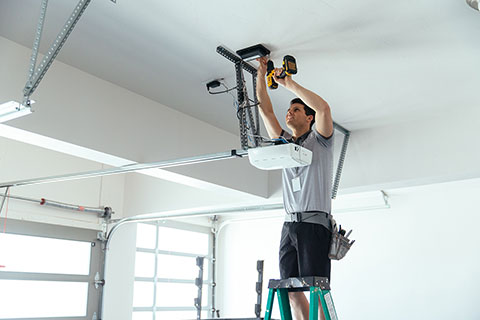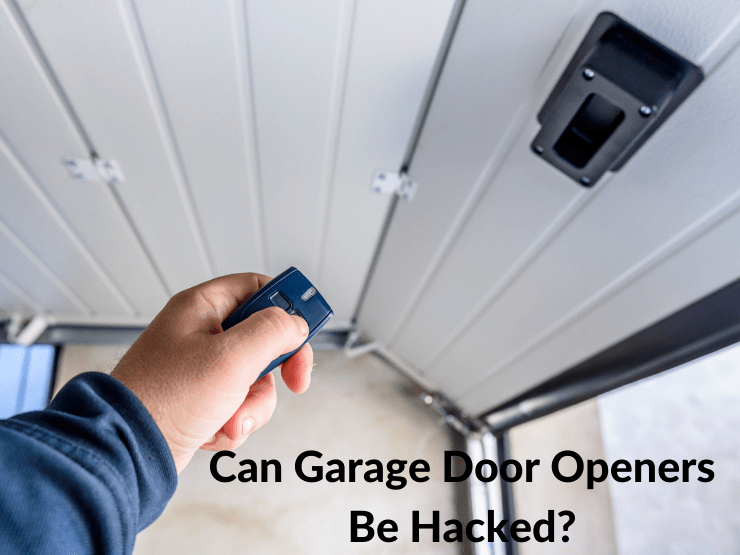How to secure a garage door against code grabbers? Well, let’s start by saying that your garage door is like the entrance to your home, and you want to make sure it’s as secure as can be. Code grabbers, those sneaky devices that can intercept and replicate your garage door code, are a real concern. But fear not, because in this article, we’re going to uncover some practical tips to keep those code grabbers at bay and protect your garage and home.
Now, you might be wondering, “What exactly are code grabbers?” Well, these clever gadgets can capture and mimic the code that your garage door opener sends out, giving unauthorized individuals access to your garage and potentially your home. But worry not, because with a few simple steps, you can fortify your garage door against these crafty code grabbers.
So, how can you secure your garage door against these mischievous code grabbers? Stick around, because in the next few paragraphs, we’ll dive into some effective strategies that will ensure your garage door remains locked tight and impenetrable to those pesky code grabbers. It’s time to take control of your garage door’s security and keep your home safe.
- Change the default manufacturer’s code.
- Enable rolling codes, which change after each use.
- Upgrade to a more advanced opener with enhanced security features.
- Install a security camera to monitor the garage area.
- Consider adding a manual lock for extra protection.
Keep your garage and belongings safe from code grabbers with these simple steps. Follow this guide and secure your garage door today!

How to Secure a Garage Door Against Code Grabbers: Protecting Your Home and Property
Garage doors are a common entry point for burglars, and one method they use to gain unauthorized access is through code grabbers. Code grabbers are devices that can capture and replay the radio frequency signals emitted by garage door openers, allowing them to mimic the opener’s signal and open the door. This poses a significant security risk for homeowners. In this article, we will explore various methods to secure a garage door against code grabbers, providing you with peace of mind and ensuring the safety of your home and property.
Why are Code Grabbers a Threat and How Do They Work?
Before diving into the solutions, it is essential to understand the threat posed by code grabbers and how they work. Code grabbers are small electronic devices that intercept the signals transmitted between a garage door opener and its remote control. When you press the remote control button, it sends a unique identifying code to the opener. Code grabbers capture and store this code, allowing the attacker to replay it later to open the garage door without the remote control. These devices can efficiently work on fixed codes or rolling codes, making them a significant security concern for homeowners.
Increasing Garage Door Security: Proven Methods to Keep Code Grabbers at Bay
Now that we understand the threat, let’s explore some effective methods to secure our garage doors against code grabbers:
1. Upgrade to a Rolling Code Opener
The most secure and recommended solution is to upgrade your garage door opener to a rolling code system. Unlike fixed code systems, rolling code systems generate a new code every time the door is opened, making it virtually impossible for code grabbers to capture and reuse the signal. Rolling code openers provide an added layer of security and peace of mind.
2. Enable Two-Factor Authentication
Another effective way to secure your garage door is to enable two-factor authentication. Many modern garage door openers come with this feature, which requires you to input a PIN or password in addition to pressing the remote control button. By enabling two-factor authentication, you add an extra level of protection that code grabbers cannot bypass easily.
3. Change the Manufacturer’s Default Codes
Most garage door openers come with default codes for convenience during installation. However, these default codes are often well-known and can be easily exploited by code grabbers. Take the time to change the manufacturer’s default codes to unique and secure ones. Use a combination of letters, numbers, and special characters to create a strong and hard-to-guess code.
4. Install a Garage Door Security System
In addition to securing the opener itself, it is essential to invest in a comprehensive garage door security system. These systems can include sensors, alarms, and cameras that detect and deter any unauthorized access attempts. By installing a security system, you create an additional layer of protection for your garage and home.
5. Keep Your Garage Door Remote Secure
One common mistake homeowners make is leaving their garage door remote control in plain sight, such as in their vehicles or on a keychain. This makes it an easy target for code grabbers who can gain access to your garage by simply stealing or hacking into your remote. Always keep your remote control in a secure and discreet location to prevent unauthorized use.
6. Use Signal Blocking Technology
Signal blocking technology, such as a Faraday pouch or sleeve, can be an effective way to prevent code grabbers from intercepting the signals between your remote control and garage door opener. These pouches create a shielded space that blocks radio frequency signals, ensuring they cannot be captured by code grabbers. Place your remote control inside the pouch when it is not in use to maintain the security of your garage door.
7. Regularly Update and Maintain Your Garage Door Opener
Lastly, it is crucial to stay updated with the latest firmware and security patches for your garage door opener. Manufacturers frequently release updates to address any vulnerabilities and enhance security. Regularly check for updates and install them promptly to keep your garage door opener protected against code grabbers.
Additional Measures to Strengthen Garage Door Security
Alongside the methods mentioned above, here are three more measures you can take to strengthen the security of your garage door:
1. Install Additional Locks
Consider installing additional locks on your garage door for added security. These locks can act as a physical deterrent, making it more difficult for burglars to force open the door even if they manage to bypass the opener’s security features. Consult a professional locksmith to find the most suitable locking mechanisms for your garage door.
2. Use a Timer-to-Close Function
Many modern garage door openers come with a timer-to-close function that automatically closes the door after a specified period. By activating this feature, you ensure that your garage door will not remain open for extended periods, reducing the likelihood of unauthorized entry. Set the timer according to your needs and preferences.
3. Install Motion Sensor Lights
Outdoor motion sensor lights are an effective deterrent against burglars. Install these lights near your garage door to illuminate the area whenever motion is detected. It will not only discourage potential intruders but also provide you with added visibility and security when entering or exiting your garage at night.
Wrapping Up: Protecting Your Garage Door Against Code Grabbers
Securing your garage door against code grabbers is crucial to protect your home and property from unauthorized access. By following the methods and measures outlined in this article, such as upgrading to a rolling code opener, enabling two-factor authentication, and implementing additional security features, you can significantly reduce the risk posed by code grabbers. Remember to regularly update and maintain your garage door opener and keep your remote control secure. By taking these steps, you can enjoy enhanced peace of mind and ensure the safety of your garage and home.
Key Takeaways: How to Secure a Garage Door Against Code Grabbers
– Avoid using easily guessable codes like birthdates or phone numbers.
– Install a rolling code technology garage door opener.
– Keep your garage door remote securely with you and not visible in your car.
– Consider adding extra security measures like a security camera or alarm system.
Frequently Asked Questions
Welcome to our FAQ section, where we’ll be answering some of the most common questions about securing a garage door against code grabbers. Code grabbers are devices that can intercept the codes transmitted by your garage door opener and gain unauthorized access to your home. To protect your home and loved ones, it’s essential to take appropriate measures to secure your garage door. Let’s dive into some of the frequently asked questions about this topic.
1. How can I secure my garage door against code grabbers?
To secure your garage door against code grabbers, start by upgrading to a modern rolling code garage door opener. These openers change the access code every time you use the remote, making it extremely difficult for code grabbers to gain entry. Additionally, make sure to disable the manufacturer’s default codes and change them to unique ones on both the garage door opener remote and the control panel inside your garage. This eliminates the risk of someone using a factory-set code to gain access to your garage.
Another important step is to reinforce the physical security of your garage. Ensure that the door is made of sturdy materials, such as solid wood or reinforced steel, and install a deadbolt lock on the door leading from the garage into your home. Consider adding a security system with motion detectors and security cameras to further enhance your garage’s security.
2. Are there any additional ways to secure my garage door against code grabbers?
Absolutely! One effective measure is to install a wireless keypad entry system. This allows you to enter a unique code directly into the keypad to open the garage door, eliminating the need for a remote. Make sure to choose a keypad with rolling codes for added security. Additionally, you can install a garage door monitor that alerts you whenever the garage door is opened or closed, providing an extra layer of security and peace of mind.
Regularly updating the firmware of your garage door opener is also essential. Manufacturers often release firmware updates that address security vulnerabilities, so keep an eye out for any updates and install them promptly. It’s also a good idea to periodically check the functionality of your garage door opener and remote to ensure they are working properly and not transmitting any suspicious signals.
3. Can I secure my garage door if I have an older model opener?
Yes, even if you have an older model garage door opener, there are still steps you can take to enhance its security. Start by manually disabling the remote’s rolling code feature, if it has one, and change the access code regularly. Avoid using the same code for an extended period and use a combination that is not easily guessable. You can also add a secondary locking mechanism to your garage door, such as a slide bolt lock or a padlock, to prevent unauthorized entry.
Consider installing a garage door timer that automatically closes the garage door after a certain period of time, providing an extra layer of protection against accidental or intentional garage door openings. Remember, while older model openers may not have the advanced security features of modern ones, you can still take proactive steps to improve their security.
4. Should I notify my neighbors about securing my garage door against code grabbers?
While it’s not necessary to notify your neighbors about securing your garage door against code grabbers, it can be a good idea to promote a sense of community awareness. Sharing information about the importance of securing garage doors can help educate your neighbors about potential risks and encourage them to take necessary security measures as well. Consider starting a conversation or creating a neighborhood group to discuss home security strategies and share tips with each other.
Furthermore, if you notice any suspicious activity or have experienced a security breach related to your garage door, it’s important to inform your neighbors and local authorities. By working together, you can create a safer environment for everyone in your neighborhood.
5. Are there any DIY techniques to secure a garage door against code grabbers?
Yes, there are several DIY techniques you can implement to enhance the security of your garage door against code grabbers. One simple yet effective measure is to install a shield or cover over your garage door opener, blocking the signals it emits and preventing code grabbers from intercepting them. You can use materials like aluminum foil or a metal mesh to create a makeshift shield.
Another DIY method is to use a longer access code, if your opener allows it. By using more digits than the default code length, you increase the number of potential combinations, making it more difficult for code grabbers to guess the correct code. Additionally, regularly changing your access code, especially if you suspect it may have been compromised, provides an added layer of security.
However, it’s important to note that these DIY techniques may not provide the same level of security as professional-grade solutions. If you’re concerned about the security of your garage door, it’s recommended to consult with a professional locksmith or security expert who can recommend the most effective measures for your specific situation.

Summary
Securing your garage door against code grabbers is important to keep your home safe. Code grabbers are devices that can intercept and reproduce the signal from your garage door remote, allowing unauthorized access. To protect against this, make sure to regularly change your garage door remote’s code. Additionally, consider upgrading to a rolling code system, which changes the code every time you use it, making it much more difficult for code grabbers to gain access. Finally, keeping your garage door remote hidden and not leaving it in your car can help prevent it from falling into the wrong hands. By following these steps, you can ensure that your garage door remains secure and your home stays protected.

